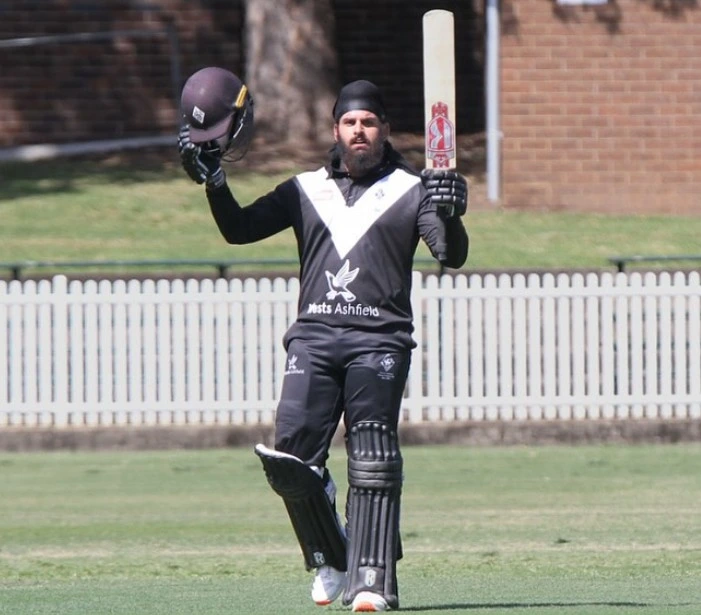(October 15, 2025) It’s not often that the cricketing world stops to take notice of a club match in Sydney. But when 20-year-old Aussie-Punjabi powerhouse Harjas Singh, a 2024 Under-19 World Cup champion unleashed what many are calling the ‘innings of the century’, the cricketing fraternity across continents sat up in awe.
314 not out off just 141 balls.That was Harjas’s staggering score for Western Suburbs against Sydney Cricket Club in the NSW Premier Cricket 50-over competition at Ashfield’s Pratten Park in the first week of October. He smashed 35 massive sixes and 12 boundaries – a jaw-dropping 258 runs in boundaries alone, rewriting record books and leaving even seasoned pros speechless.
Coming in at No. 3, Harjas reached his milestones with surgical precision: 50 off 33 balls, 100 off 74, 200 off 102, and then went berserk in the death overs, scoring 88 runs off his final 23 deliveries. He brought up his triple hundred with a towering six off spinner Tom Mullen, finishing unbeaten as Western Suburbs piled up 483/5 and sealed a 196-run win. Incredibly, no teammate crossed 37. It was an exhibition of pure, solitary dominance.
View this post on Instagram
The shots kept soaring over Pratten Park’s trees, and so did the headlines. “Highest score ever in a 50-over first-grade match,” screamed the news tickers, as tales of lost cricket balls and awestruck opponents spread like wildfire.
The Indian-origin prodigy
For many in India, the name Harjas Singh may still be new. But this young man has already carved his place in Australia’s cricketing landscape, and carries a story that resonates deeply with the Indian diaspora. Born in Sydney in 2005, Harjas is the son of Punjabi parents who migrated from Chandigarh in 2000, bringing with them the values of discipline and determination that have come to define their son’s journey.
“I grew up in a Punjabi household,” he shared in an interview, “and I think that’s where a lot of my strength comes from.” He even credits the Sikh martial art Gatka, which simulates sword fighting with wooden sticks, for building his power game. “You have to have very strong wrists for that,” he said with a smile during a recent podcast.
Making of the champion
Harjas’s cricketing story began like many others through chance and persistence. At just eight, he turned up as a substitute for the Revesby Workers Cricket Club in New South Wales. What began as a fill-in appearance soon became a calling. Under the sharp eyes of Neil D’Costa, the celebrated coach who has trained cricketers like Michael Clarke, Phil Hughes, Mitchell Starc and Marnus Labuschagne, Harjas’s game took shape.
Interestingly, he started as a right-handed batter but switched to batting left-handed to avoid breaking the family’s windows while playing in the backyard. The switch stuck. Today, he bats left-handed but still bowls and throws with his right.
Three years ago, before he even turned 17, he became one of the youngest centurions in Sydney first-grade history. Soon after, he was donning national colours, first making his Youth Test debut against England in 2023 (where he struck a classy 100 off 169 balls), and then his ODI debut for Australia U19.
But his defining early moment came earlier this year, when he top-scored with 55 off 64 balls in Australia’s Under-19 World Cup final victory over India in South Africa. That innings, built on patience and poise, made him a household name in Australian cricketing circles, even if it broke many Indian hearts.
The day of 35 sixes and 314 not out
When Harjas walked out to bat for Western Suburbs that fateful day, he wasn’t chasing records. “At the start, the spinners had just come on,” he recalled in a recent podcast. “That’s where I love doing my best work… just get the feel of the game, see how the wicket’s going.”
Seventy balls later, he was already on 100. And then something clicked. “After 100, I had relaxed… whatever happens, happens,” he said. The fear was gone; in its place came freedom. “I just tried to hit everything for six.”
By the time he was done, he had hit 35 sixes, turned a game into an event, and announced himself as one of the most explosive young batters in the world. Yet when asked about the innings, his mind wasn’t on the sixes or the records, it was on recovery. “I was just mentally gone,” he laughed. “I think that’s the only time I’ve had to just sit down and breathe.”

Learning from failure
Behind that carefree hitting lies a far more grounded story. The last two seasons hadn’t gone to plan. The runs were inconsistent, the contracts didn’t come. “Being disappointed that I didn’t get a contract last year—obviously it hurts,” Harjas admitted. “And to be honest, I don’t think I deserved one either.”
Instead of sulking, he got to work. “The pre-season was probably the most intense I’ve ever done… breath work, fitness, batting five days a week,” he said. But the biggest change was internal. “I stopped worrying about everyone else… I made a big push on just worrying about my own world—what can I do Monday to Friday to be the best on Saturday?”
The result was transformation, not just in numbers but in mindset. “Everything’s just switched,” he said. That switch—mental, physical, emotional lit the spark that produced 314 not out.
Breathing through the pressure
Part of Harjas’s growth story is how modern his methods are. He has brought mindfulness into cricket. “You use your breathing, ice baths, and oxygen resistance training to prepare for a game without being in a game,” he explained. It’s a technique to manage nerves and sharpen focus. “You can’t look to hit your third or fourth ball for six if you’re still shaking,” he smiled. “But when you’re grounded, when you’re relaxed, it’s a lot easier.”
He still trains like an old-school batsman doing underarm drills after work, working on the full face of the bat, and hitting balls under the eyes to perfect timing. “Train the way you play,” he quoted his coach. “If you’re going to hit a six first ball in a match, you need to be able to do it in training too.”
The club that backed him
Ask him about his club, and his voice softens. “For the last three or four years I’ve been there, I’ve done donuts… and the fact that they all still respect me and love me for the bloke that I am. It means a lot,” he said. “The board has trusted me and been unbelievable.” For Harjas, Western Suburbs is more than a club has been like a family that stuck with him through lean years, and now celebrates his success like their own.
His club mentor’s mantra, “Start again. Start again.” is something he carries like a prayer. It’s what separates those who peak once from those who keep climbing.
The Indian in his soul
For all his Australian training, Harjas remains deeply Indian at heart. He laughs about his only superstition of never placing his helmet face-down on the turf. “I always respect the ground I’m playing on,” he said, a gesture that echoes the reverence Indian players show before stepping onto the pitch.
Raised with Punjabi warmth and discipline, he blends two cricketing worlds—the emotional intelligence of Indian cricket with the fearless tempo of the Australian game. It’s a mix that could define the next generation of global players.
View this post on Instagram
The road ahead
Having already played for Sydney Thunder in a T10 competition, Harjas’s next goal is to earn a state contract and make the leap to professional cricket. The headlines will follow, but he’s more focused on the process than the fame.
As he readies to walk out again, helmet badge facing up, the weight of expectation will be heavy. But Harjas Singh has already learned the secret that many take years to grasp that greatness is not in one innings, but in the ability to begin anew. “If everything was given to me straight away, I would have been an arrogant prick,” remarked the grounded young man.
When he steps onto the field next, the voice in his head will whisper what has become his motto is two simple words that turned a 20-year-old into a headline and that’s “Start again.”
- Follow Harjas Singh on Instagram
ALSO READ: Saurabh Netravalkar: India-born AI engineer who led USA to Super Eight in T20 World Cup




